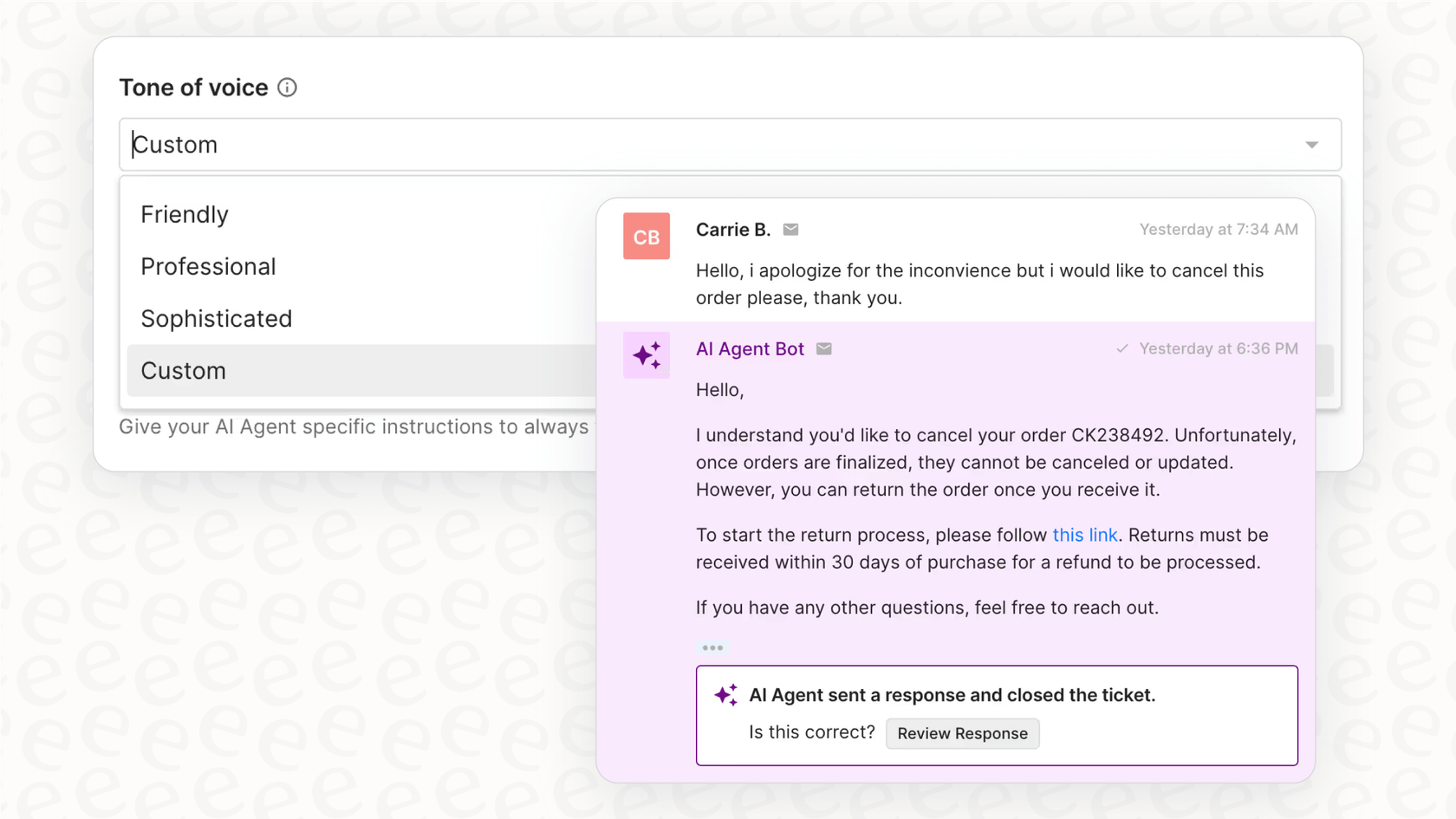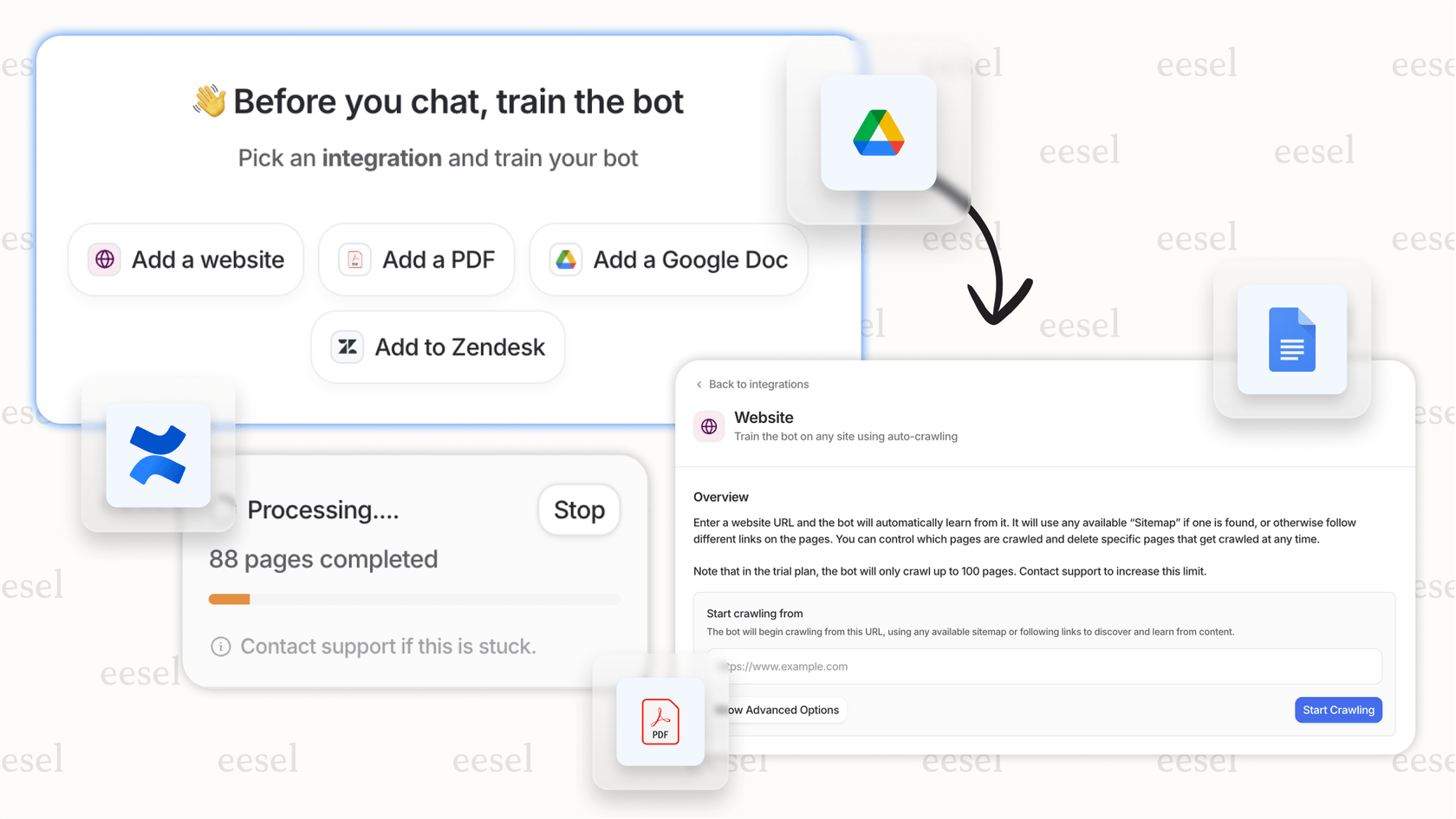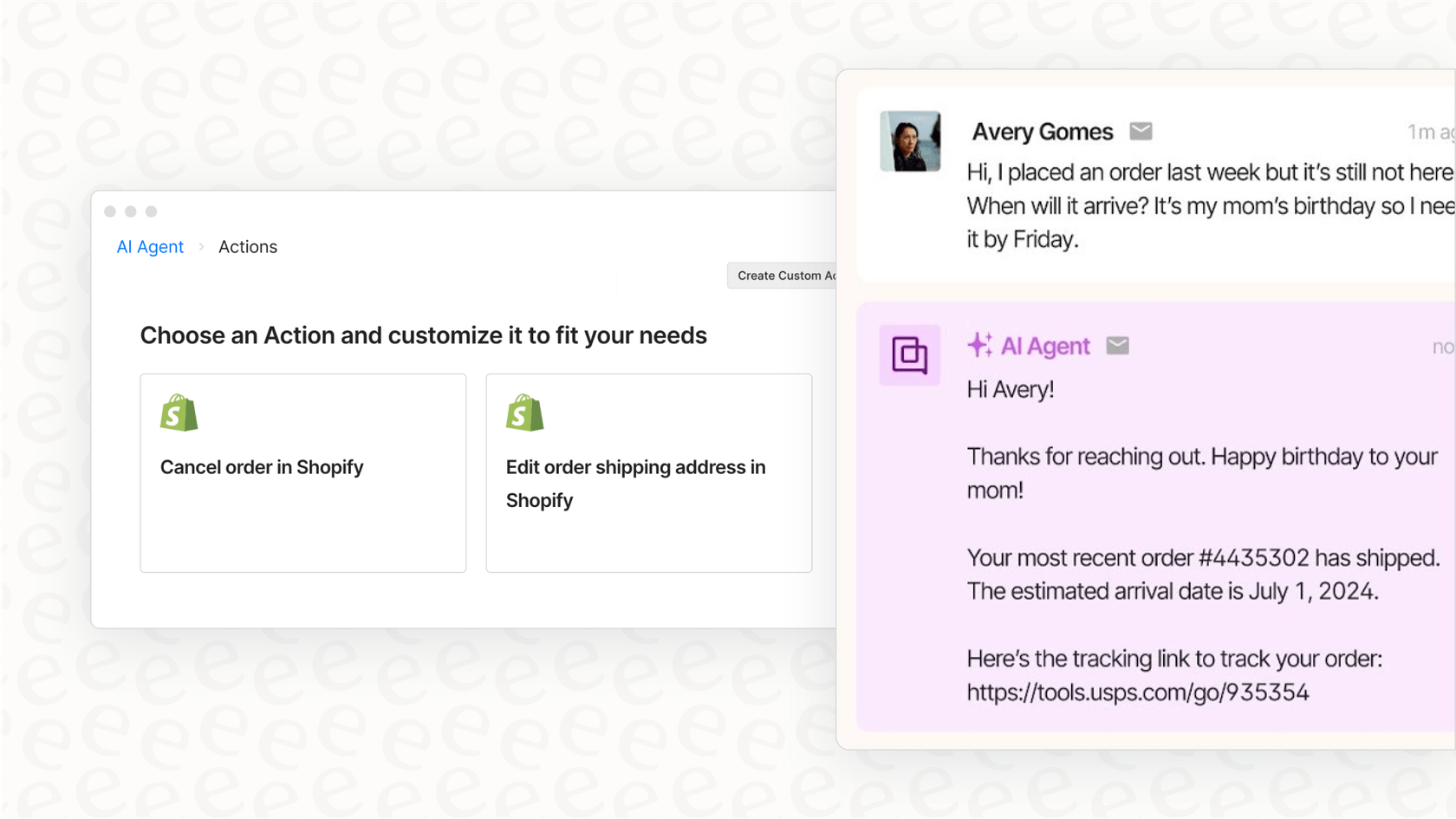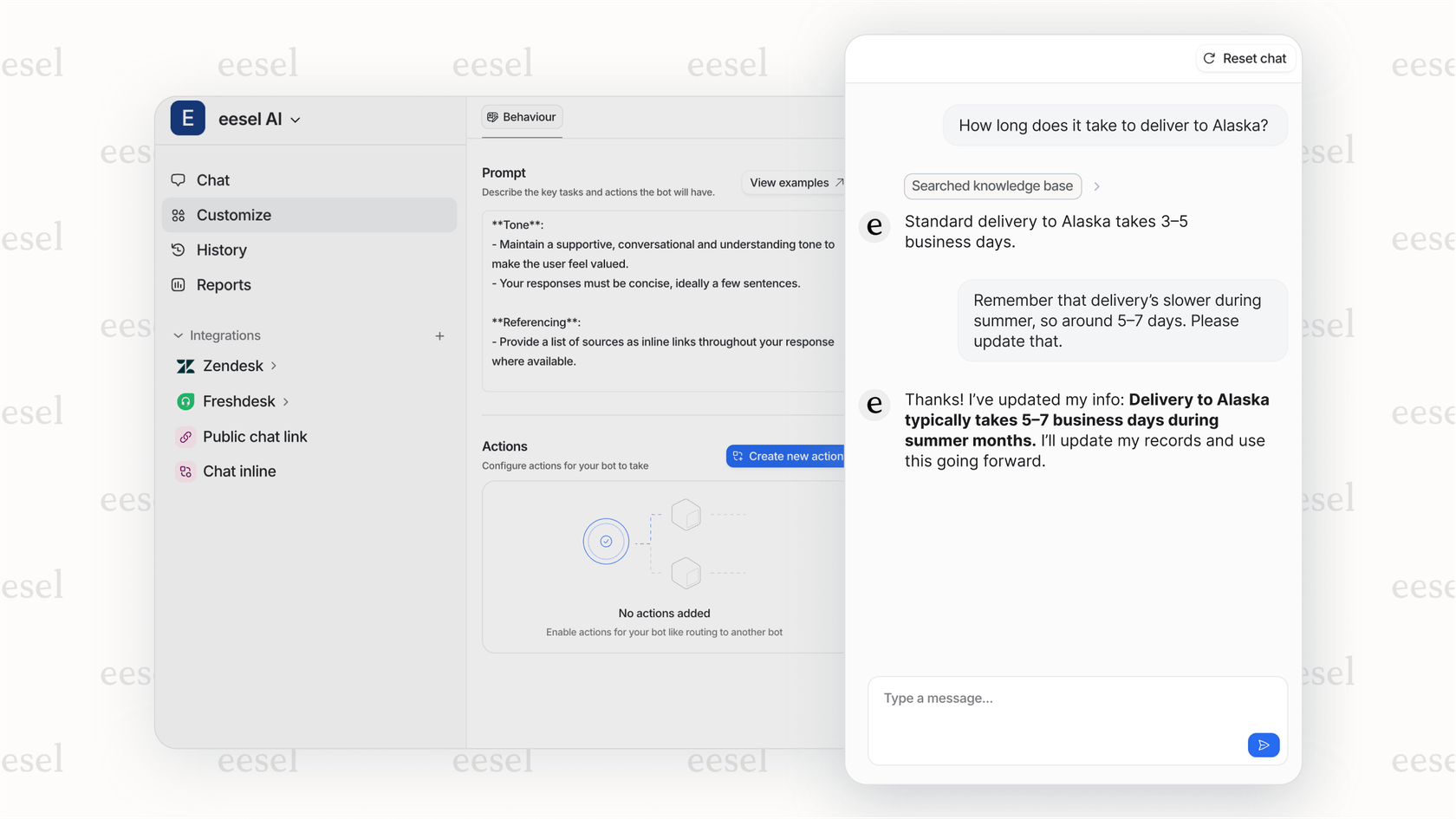A complete guide to the Gorgias knowledge base

Stevia Putri

Stanley Nicholas
Last edited January 16, 2026
Expert Verified

When someone's on your e-commerce site, the last thing they want is to wait for an answer. Whether they're tracking an order or just curious about your return policy, they expect information instantly. A good knowledge base is often the difference between a happy customer and a frustrated support ticket.
Gorgias, a leading helpdesk for e-commerce brands, provides a robust Help Center as a core part of its platform. It’s designed to let customers help themselves, anytime. It’s a powerful tool on its own, and when you layer in additional AI capabilities, you can create the kind of automated, effortless support that today's shoppers expect.
This guide will walk you through the ins and outs of the Gorgias knowledge base. We’ll cover its features, what it does well, and how you can layer in AI to turn your Help Center into a seriously powerful automation tool.
What is a Gorgias knowledge base?
Think of the Gorgias knowledge base as more than just a static page with a list of questions. It's an interactive Help Center built to handle common questions, answer pre-sales queries, and offer support 24/7, all without needing a live agent to step in.
It pulls double duty, really.
First, it’s a public-facing portal for your customers. This is where they can go to find articles, track their orders, and solve problems on their own time. If they have questions about shipping times, returns, or product specs, this is their first stop.
Second, it can be a private, internal resource for your own team. You can set it up as an internal library filled with company policies, troubleshooting guides, and product details. This gives your agents a single place to find answers, which helps them solve customer issues faster and more consistently. The whole thing is designed to work hand-in-hand with the main Gorgias helpdesk, creating a smoother support workflow for everyone.
Core features and benefits of the Gorgias knowledge base
Gorgias has built a solid foundation for customer self-service, with features that are tailored for the fast pace of e-commerce.
Reduce support tickets with self-service
The Gorgias Help Center is excellent at providing resolutions for those common queries like "Where is my order?" (WISMO), return policy questions, and shipping details. By making this info easy to find, you free up your support team to handle the more complex conversations that require a human touch. Gorgias notes that merchants using their self-service tools can deflect up to 50% of tickets that don't need an agent, which is a significant efficiency boost.
Customize your help center to match your brand
Your help center is part of your brand, and Gorgias makes it easy to ensure it looks the part. Gorgias gives you a great set of customization options, so you can add your logo and a banner image, pick from thousands of fonts and colors, and even use custom code. This creates a consistent brand experience, so when a customer clicks from a product page to your Help Center, the journey feels natural and professional.

Make information findable with clear organization and search
Gorgias lets you organize your articles into logical categories and subcategories, like "Shipping," "Returns & Exchanges," or "Product FAQs." This structure makes it simple for visitors to browse. Plus, it features a predictive search bar that suggests articles as someone types, helping them find the right answer quickly and efficiently.
Track performance with Google Analytics
Gorgias has a native integration with Google Analytics that lets you track important metrics like page views, which articles are most popular, and what search terms customers are using. This data is invaluable. It helps you see which content is performing best, understand what's on your customers' minds, and decide which new articles will be most helpful to your audience.

How to set up and manage your Gorgias knowledge base
Getting a Gorgias knowledge base live is straightforward, allowing you to quickly build a resource for both your customers and your internal team.
Identify what content to create
The best articles come from real customer questions. By checking your Tags and Intents statistics within Gorgias, you can quickly spot the topics that generate the most interest. If you see that many customers are asking about your warranty policy, that’s a clear sign you can provide value with a detailed article covering it.
Use templates and AI suggestions to get started quickly
To make creation easier, Gorgias offers pre-built article templates for common e-commerce topics like shipping and returns. This gives you a professional structure to start with. Gorgias also provides helpful AI-generated article suggestions that look at your ticket history and propose ideas for new content, helping you proactively build your library based on real customer needs.
Create an internal knowledge base for your team
Gorgias lets you create a private, internal-only knowledge base for team procedures and troubleshooting guides. You can easily ensure this doesn't show up on public search engines by adding a "noindex" meta tag in the "Extra HTML" section of your Help Center settings. This keeps these pages a secure and dedicated resource for your agents.
Maximizing your Gorgias knowledge base with AI
While the Gorgias Help Center is a solid foundation, adding specialized AI tools can help you scale your automation and handle even more nuanced customer needs. This is a great way to provide advanced automation.
Connecting knowledge from across your company
The Gorgias knowledge base is excellent for hosting support articles. However, some teams have knowledge spread across other tools like Google Docs, Confluence, or Notion.
The AI approach: You can use a tool like eesel AI as a complementary hub. It connects with Gorgias and over 100 other sources, allowing your AI agent to pull answers from across your entire tech stack while still living within your Gorgias workflow.

Automating content drafting
While Gorgias provides excellent suggestions, as you grow, you might want to automate more of the drafting process.
The AI approach: An AI agent like eesel AI can learn from the context of your past resolutions in Gorgias to help draft new knowledge base articles automatically, ensuring your Help Center stays ahead of customer questions.
Creating a conversational experience
The standard Gorgias knowledge base is a great library. For teams that want to offer a more interactive, conversational experience, adding a chatbot can be a great next step.
The AI approach: The eesel AI Chatbot works alongside your Gorgias knowledge base to provide direct, conversational answers. It can also integrate with other tools like Shopify to look up order statuses or escalate tickets directly within your Gorgias integration.

Testing and forecasting impact
When launching a major update to your support strategy, it's helpful to have a clear idea of the potential impact.
The AI approach: eesel AI offers a simulation mode that works with your Gorgias data. Before going live, you can run simulations against your historical tickets to get a data-backed forecast of your automation rate and ROI, allowing you to launch with confidence.

How much does the Gorgias knowledge base cost?
The Gorgias Help Center is included in all of its pricing plans, making it accessible for teams at any stage. While the ability to create and publish articles is standard, Gorgias offers an Automation Add-On for teams looking for advanced features like automated self-service order management.
Gorgias's pricing is designed to scale with your business based on the number of "billable tickets." Here’s a quick look at their core plans:
| Plan | Starting Price (Monthly) | Key Features Included | Automation Add-On |
|---|---|---|---|
| Starter | $50/mo | Help Center, 50 tickets/mo | Available |
| Pro | $300/mo | Help Center, 500 tickets/mo | Available |
| Advanced | $750/mo | Help Center, 3000 tickets/mo | Available |
| Enterprise | Custom | Custom ticket volume | Available |
Your Gorgias knowledge base is a solid foundation that’s ready for an AI upgrade
The Gorgias knowledge base is a reliable and valuable tool for any e-commerce brand that wants to offer professional self-service. It's excellent at deflecting repetitive questions and creating a branded experience. It is truly a fantastic foundation to build on.
As your support volume grows, you can further enhance this foundation with smart AI layers that work within the Gorgias ecosystem. The best strategy is to maximize the strengths of Gorgias and add specialized tools when you need to solve complex automation challenges.
Give your Gorgias knowledge base an AI boost with eesel AI
Instead of changing the tools your team loves, eesel AI connects directly to your Gorgias helpdesk as a complementary partner. It works as an intelligent assistant for your support operation, making your existing Gorgias setup even more powerful.
-
Go live in minutes: You can set up and configure your AI agent easily to work with your current Gorgias workflow.
-
Unify your knowledge: Seamlessly connect Gorgias with other sources like Google Docs or Confluence for a more comprehensive knowledge pool.
-
Automate with confidence: Use the risk-free simulation mode to see your expected results and ROI before you launch.
-
Simple, predictable pricing: Enjoy transparent plans that allow your business to grow without unexpected costs.
Ready to see how AI can enhance your support? Start your free eesel AI trial today.
Frequently asked questions
A Gorgias knowledge base is an interactive Help Center designed for self-service, handling common questions, pre-sales queries, and 24/7 support without needing a live agent. It functions as both a public portal for customers and a private internal resource for your support team.
A Gorgias knowledge base reduces tickets by providing instant answers to common questions like order tracking or return policies, enabling "zero-touch" resolutions. This frees up your support agents to focus on more complex customer issues that require human intervention.
Yes, you can extensively customize your Gorgias knowledge base to match your brand by adding your logo, banner image, selecting fonts and colors, and even using custom code. This ensures a consistent brand experience for your customers.
While the standard setup is excellent for hosting articles, teams often expand its reach by integrating AI to unify knowledge from external sources, automate content drafting based on ticket history, or add conversational assistant capabilities.
AI tools can unify knowledge from various sources, assist in content creation by learning from past tickets, and transform the Gorgias knowledge base into a conversational assistant that can understand nuanced questions. They can also provide impact simulations to help optimize your strategy.
The Gorgias knowledge base is included in all Gorgias pricing plans. For teams looking for advanced interactive features like automated self-service order management, Gorgias offers the "Automation Add-On." Pricing is typically based on billable tickets.
To identify content, you should analyze your Gorgias "Tags" and "Intents" statistics to pinpoint topics that generate the most support tickets. Gorgias also offers pre-built templates and helpful AI-generated article suggestions based on your ticket history.
Share this post

Article by
Stevia Putri
Stevia Putri is a marketing generalist at eesel AI, where she helps turn powerful AI tools into stories that resonate. She’s driven by curiosity, clarity, and the human side of technology.




